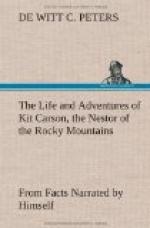the rim of the Great Basin. Afterwards, along
the eastern base of the Sierra Nevada, where we traveled
for forty-two days, I saw the line of lakes and rivers
which lie at the foot of that Sierra; and which Sierra
is the western rim of the Basin. In going down
Lewis’s Fork and the main Columbia, I crossed
only inferior streams coming in from the left, such
as could draw their water from a short distance only;
and I often saw the mountains at their heads, white
with snow; which, all accounts said, divided the waters
of the desert from those of the Columbia, and
which could be no other than the range of mountains
which form the rim of the Basin on its northern side.
And in returning from California along the Spanish
trail, as far as the head of the Santa Clara Fork
of the Rio Virgen, I crossed only small streams making
their way south to the Colorado, or lost in sand—as
the Mo-hah-ve; while to the left, lofty mountains,
their summits white with snow, were often visible,
and which must have turned water to the north as well
as to the south, and thus constituted, on this part,
the southern rim of the Basin. At the head of
the Santa Clara Fork, and in the Vegas de Santa Clara,
we crossed the ridge which parted the two systems
of waters. We entered the Basin at that point,
and have traveled in it ever since, having its southeastern
rim (the Wahsatch Mountain) on the right, and crossing
the streams which flow down into it. The existence
of the Basin is, therefore, an established fact in
my mind; its extent and contents are yet to be better
ascertained. It cannot be less than four or five
hundred miles each way, and must lie principally in
the Alta California; the demarcation latitude of 42
deg. probably cutting a segment from the north part
of the rim. Of its interior, but little is known.
It is called a desert, and, from what I saw
of it, sterility may be its prominent characteristic;
but where there is so much water there must be some
oasis. The great river and the great lake
reported may not be equal to the report; but where
there is so much snow, there must be streams; and where
there is no outlet, there must be lakes to hold the
accumulated waters, or sands to swallow them up.
In this eastern part of the basin, containing Sevier,
Utah, and the Great Salt lakes, and the rivers and
creeks falling into them, we know there is good soil
and good grass, adapted to civilized settlements.
In the western part, on Salmon-trout River, and some
other streams, the same remark may be made.”
“The contents of this Great Basin are yet to be examined. That it is peopled, we know; but miserably and sparsely. From all that I heard and saw, I should say that humanity here appeared in its lowest form, and in its most elementary state. Dispersed in single families; without fire-arms; eating seeds and insects; digging roots (and hence their name); such is the condition of the greater part. Others are a degree higher, and live in communities




